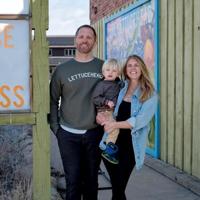
Since taking over the Lettucehead nearly three years ago, Adam and Anna Heinauer have enjoyed getting to know each shopper who comes in.
“We’ve enjoyed being part of that community,” Adam said. “We’ve gotten to know people, and that’s been really special.”
“It’s definitely made us feel a part of town,” Anna said. “We get to talk to all of our customers and they tell us what they like and don’t like. We hear everything, which is really nice.”
Previously, the Heinauers lived in Denver, where they worked in healthcare consulting. After moving to BV, they felt owning a small business would be a great way to be part of their community. Anna’s work in patient quality and population health projects fueled her interest in nutrition.
“I ended up going through an integrated nutrition health program,” she said. “We were just really interested in food in general, we’re big cooks. What we really liked about the Lettucehead was the local presence, and we’ve definitely ramped that up since we’ve taken over. … We just love high-quality foods and feeling connected to what you’re eating.”
They’ve also begun pursuing a grant from the Department of Agriculture to help expand access to healthy food. They heard about the opportunity through the farmers they partner with.
“It really got us thinking, ‘How do we expand awareness in our community about healthy food,’ knowing a lot of people don’t know we exist and that we source from all these local farmers and ranchers,” Anna said. “The grant itself is focused on raising awareness in the community about our acceptance of EBT and food stamps.
“We’re trying to find other outlets to expand access for the community,” she said. “Back in the fall, we implemented a new loyalty program. For every $100 people spend in the store, they get a $7 store credit. They’re essentially getting 7 percent back on all their purchases.”
The loyalty program, Anna said, allows them to maintain margins while keeping groceries affordable and accessible.
“I know how expensive groceries are for everyone,” she said. “Especially since we are focused on high-quality, locally sourced, nutrient-dense foods, it does come with a higher price point. This is a way we’re hoping to continue to expand access.”
Anna feels that many people don’t realize that Lettucehead accepts EBT and food stamps.
“We’ve accepted it the whole time (since taking over),” she said. “The previous owner did, as well.”
“It’s a question we get, whether we accept that,” Adam said. “There’s a little bit more on our side to be able to accept that, but it’s important for us to be able to do that.”
They also have an “imperfect” option for produce, consisting of food they don’t feel is good enough to sell at full price but is still great quality. Imperfect produce typically has small cosmetic blemishes.
“We make a big effort to bag up all of our imperfect produce,” Anna said. “We put it in dollar bags or $3 bags. It might be funky limes that are browning on the outside or radishes that the greens have kind of gone on. … We have people come in and just go directly to our imperfect produce shelf and grab as many bags as they can.”
One of their other goals for the year is to promote local agriculture.
“We try to source from as many local vendors as possible,” Anna said. “Adam goes to the San Luis Valley every couple of weeks and goes to Yoder Family Farm for eggs and Blue Range Ranch, which is a regenerative Audubon-certified ranch in the San Luis Valley, for beef.”
Lettucehead sources from three local farms in the summers: Headwaters Farm, Meadows Edge Farm and Trout Creek.
“As much as we can, we try to source our produce from them in the summer, during their growing season, then use our typical distributor, sourcing from California and Mexico (in the off-season,” Anna said. “We’ve actually started to work with Valley Roots Food Hub this year, as well, which has been nice because they really allow us to source from people we wouldn’t be able to get to directly. … They’ve allowed us to connect to this other network.”
Partnering with local farms allows those growers to reach new people.
“It’s allowing them to get their product out to a larger group than if they’re just going through farmers’ markets and CSAs,” Adam said. “Hopefully we’re giving them more avenues to get their food out there.”
Being in a small town, Anna and Adam are glad to be able to provide niche ingredients to local home chefs.
“We’re the only place they can find nori or preserved lemons or harissa,” Anna said, “just kind of more unique ingredients. We cram a lot of stuff into a very small space, and I think people are surprised by the breadth.”
